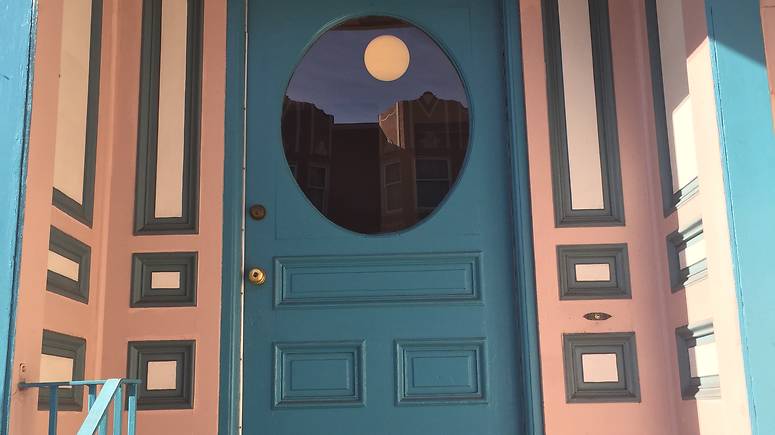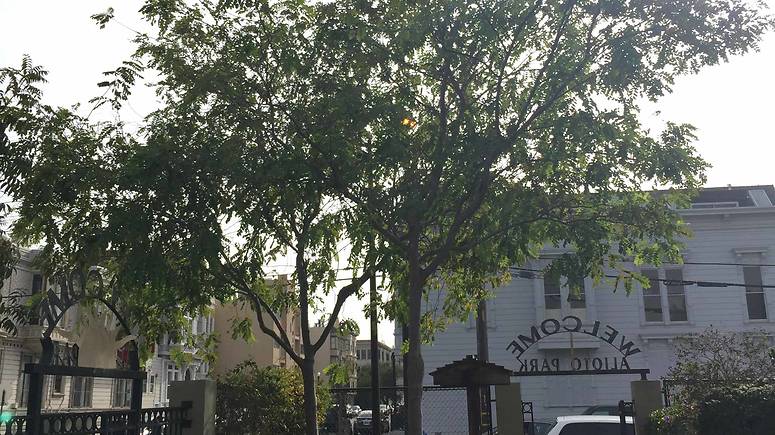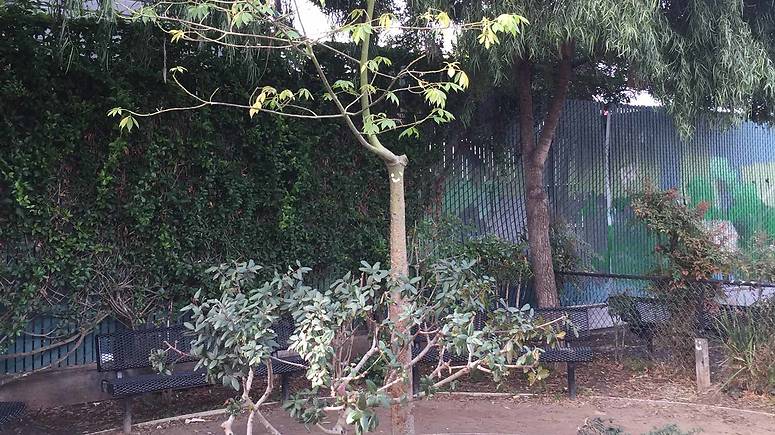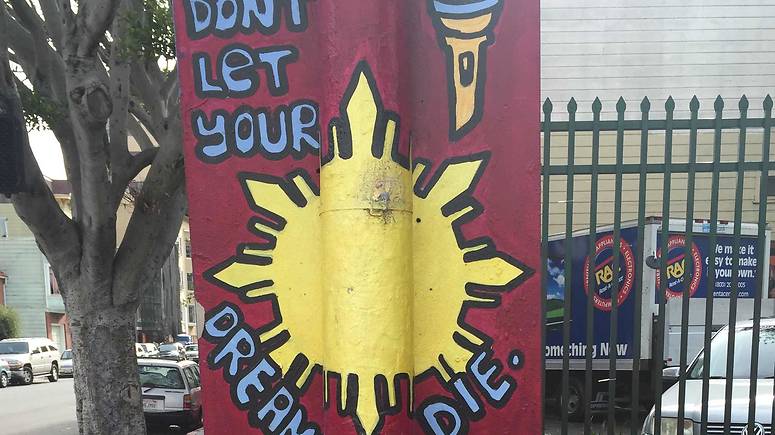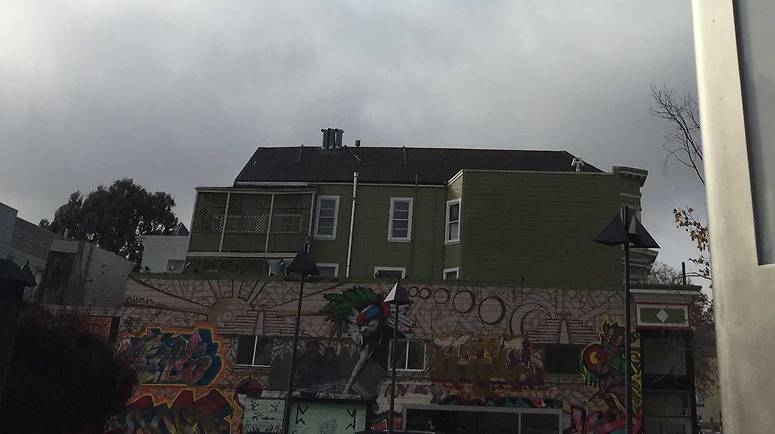
A collaborative publication of the Latin American Studies Program
Divisadero
Fall 2015
Finding the Path - La Posada
During the fall of 2014, I facilitated a student nurse position as a member of the Progress Foundation, helping clients with acute episodes of mental illness. The stories are all unique, yet blend together in a tapestry of anxiety, sorrow, redemption, and salvation. This story brings together a community of those who seek salvation for their troubled deeds and misunderstood lives.
Ernesto entered the La Posada house with tears building in his eyes, and a large cut on the bridge of his nose. The fresh cut looked angry, while his expression was solemn and exasperated. He had just made the eight block journey from San Francisco General Hospital, where he was not only treated for his cut, but for his attempted suicide.
The downtrodden, El Salvadorian man was not always so entrenched in sorrow. He had a family only a few short years ago. They were renting a house in southern California, and Ernesto worked in construction. Both his wife and young daughter were killed in an automobile accident on the way home from school.
Ernesto had always been an emotional person, at times to extremes. He had never seen a psychologist or any mental health professionals his entire life, as in his culture that could be a sign of weakness. Instead, he thought to internalize any torment for the sake of the family and his role as the provider. The death of his family shattered any ability to control his rage, his sorrow, his manic depressive symptoms which would turn to diagnosis. He lost his ability to continue work, and complete apathy washed over him like a dam crashing upon itself from the weight and force of a raging river. He left his home, sold most of his possessions, and spiraled out of control into a new life of depression, drugs, and an inability to face himself and his reality.
After many, many months of alternative living, seeing no hope available to him. He decided on a simple fact that would change his life. He was always camping out, trying to avoid authorities and other people in general. A lonely tree, an archaic oak, with large decaying branches was his home for the night. He secured the rope with a strong knot he had learned in many of his construction jobs, a knot which would not unravel. He found a stump to prop himself on while he gingerly slid the noose around the weathered skin of his neck. He looked at the empty flasks of whiskey on the ground strewn about beside his belongings; he had been drinking even more heavily to reduce his fear. He thought of his daughter’s smile as he stared down through his feet. The seconds passed like hours as he kicked away the stump, the noose receiving the full weight of his body, the constriction taking hold. As the seconds ticked past, regret and relief began to wash over his crippled, depressed thoughts. Suddenly, there was a loud crack, like ‘a gunshot’, and suddenly his body crumpled on the hard, wet earth, the tree branch following him and striking him on the bridge of his nose. Ernesto lied there for hours crying and bleeding, drowning in a shallow sea of his own sorrow. He knew he needed help. He knew he had to change his life.
***
The laughter can be heard floating through the room like a meditative wave. The house has reached a climax of the day. The group meetings for the day are over. The emotional release and tension has been eased for the few parts of the day for relaxation. The communal meal is about to be served, and Ernesto is hungry. The cooks for tonight are looking pleased with themselves as the enchiladas are taken out of the oven rocketing that savory smell of melted cheese and good intentions. For some, this is a reward for a long day of applying for various licensures and permits, visiting doctors and therapists, and looking for employment. For others, this is the first hot meal they have had in years.
La Posada is an Acute Diversion Unit (ADU), which operates in a social rehabilitation model and crisis diversion tactics. It is a home located in the Mission District providing 24-hour alternative care to hospitalization and accepts referrals from psychiatric emergency programs and inpatient units. The home provides a safe, highly structured and supervised setting for individuals with current acute symptoms of mental illness. A team of Nurse Practitioners and counselors help to facilitate services such as individual and group counseling, crisis intervention, peer support, activities of daily living, ambulatory medical support, medication support, and referrals to social services.
As Ernesto was seated and was being registered into La Posada, the look of confusion, anxiety, and defeat slowly washed away as the counselor began giving signs of hope. One of the most important aspects of La Posada is its emphasis on the Latino community with its Spanish-language capacity and trained Spanish speaking counselors. This provides a higher concentration of Spanish speaking patients who can provide a community for each other by sharing stories and experiences. The feeling of inclusiveness, understanding, and empathy began to ease Ernesto, as he realized he was not in trouble for seeking help, as he may have thought. Rather, he was encouraged and welcomed to stay to seek the help he needed and deserved. He was able to speak Spanish, which brought an entirely new dimension of relaxation to his treatment. Seeing another Latino client walk past the hallway, up the creaky stairs of the house, gave a sense of community as others just like him were becoming recognizable. Hope of redemption was becoming clearer.
The Mission district has been culturally electrified by the Latino community for many generations. With the present state of mass gentrification, the Latino community and native Spanish speakers as a whole have sought ways to stay connected and supportive of each others’ ideas and culture. So many stories starting with young men and women growing up in the Mission District as children playing in the streets, with BBQs and cookouts, and having much of the Latino neighborhoods and cultures banding together. As financial changes and real estate pricing altering the affordability of many neighborhoods took hold, many of the people resorted to drugs, gangs, and alternative living. They tell of all of these vices and behaviors available, and then sprinkle in some signs of mental illness, and the results can be volatile.
Ernesto’s story is based on many stories of breakdowns and breakthroughs found at La Posada. The program provided him with the structure he needed to help acclimate to society again, find a purpose for himself, and control his addiction and depression. These stories rarely emerge in a linear path, with a straight line to progress. Rather, the path is curvy and treacherous with episodes of relapse a commonplace. For some, the story does not have to be quite as tragic, yet still have foundations with mental illness, addiction, and, usually, a troubled past.
Other stories included accounts of immigration from native countries. This discrimination and illegal immigration status impinge on Latinos’ mental health causing fear and anxiety due to limited resources, marginalization, isolation, stigmatization, and exploitability. As Latinos face the challenges of addressing their mental health, many other life stressors remain and contribute to factors leading to the mental illness in the first place.
One of the goals of La Posada and the Progress Foundation, which provides similar housing all over the city, is to establish a sense of normalcy and independence with the residents. The communal meal and other chores and roles throughout the day are prepared by the clients on a rotating basis. Dinner is the only communal meal, and although not mandatory, it provides a sense of routine and a chance for expression and community among the residents. Old stories told without judgment, reflecting on times and lifestyles, habits and choices trying to be changed and treated. The moments of laughter, satisfaction of feeding a household, and a sense of family are created every night in this little Victorian home on Capp St. The small parts of our day which can be taken for granted; a hot meal, someone to talk to, and emotional support; can be viewed in perfect poignancy by reflecting on communities trying to improve themselves and be part of our ‘normal world.’
Two weeks have past, and as Ernesto looks around the room at the group of friends he has made, he reflects on his next steps. His bags are packed. His sobriety has become his strength. His new community has become his foundation. The next path is structured for success, a trip to another long-term home where he can further develop his focus and treatment. However, the new felt freedom hits hard like a new rain. The choices are now available once again. The path is littered with choices of the light and the dark, the strong and the weak. Ernesto’s path is still open, and the support of his community will always stand behind him.



